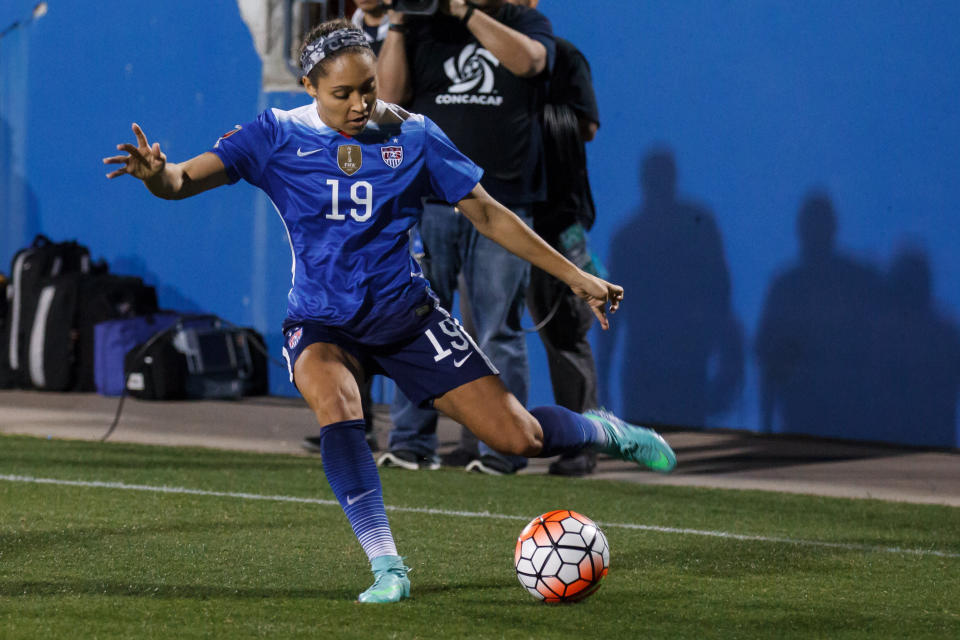Jaelene Hinkle, who refused to wear LGBTQ Pride Month jerseys, left off USWNT World Cup roster
Jaelene Hinkle, who controversially declined a U.S. national team call-up in 2017 because she did not want to wear the team’s LGBTQ Pride Month jerseys, was not included on the USWNT’s 23-player roster for the 2019 Women’s World Cup.
Hinkle, a 25-year-old left back, was not a surprising omission. She has not played for the national team in over three years. She was not considered a roster candidate heading into Thursday’s reveal.
The question is why, exactly, she never got a longer look.
Hinkle has been called into national team camp twice over the past two years. In 2017, she declined the invite for “personal reasons.” She later revealed what many suspected at the time: Hinkle, a devout Christian, “felt so convicted in my spirit that it wasn’t my job to wear” the national team’s rainbow-numbered jerseys celebrating Pride Month.
“I’m essentially giving up the one dream little girls dream about their entire life, and I’m saying no to [it],” she told The 700 Club in June 2018. “It was very disappointing.”
Her next national team opportunity arrived the following month — over a year after the initial refusal. But it was a truncated one. U.S. head coach Jill Ellis brought Hinkle into camp ahead of the 2018 Tournament of Nations in July. After three days of training, Ellis trimmed the 25-player roster down to the mandated 23. Hinkle was one of two cuts, and hasn’t been back with the team since.
Ellis said Thursday on a conference call that the decision was “solely based on soccer.”
“We had Jaelene in,” Ellis said, referencing past camps. “Got a chance to look. ... Had a lot of players. And when I look at the experience and the depth and the versatility, that’s where my decision is led.”

What are the soccer reasons for Hinkle’s exclusion?
Hinkle is considered, by some, the top left back in the National Women’s Soccer League. Her coach with the North Carolina Courage, Paul Riley, told Yahoo Sports last year that Hinkle was “the best left back in the league by a country mile.” At the very least, she’s among the best at the position, and had her strongest season yet in 2018 as the Courage steamrolled their way to a championship.
“Best left back in the league,” however, does not automatically translate to “national team-caliber.” The position is the shallowest in the U.S. player pool, a shortcoming that led Ellis to name a roster without a single natural left back. Meghan Klingenberg, who played every minute of the 2015 World Cup, hasn’t gotten a look since 2017. Casey Short, a versatile defender, consistently made rosters, but hadn’t seen the field in a U.S. jersey in over six months, and didn’t make the World Cup cut. Other strong NWSL fullbacks have received even fewer opportunities than Hinkle.
And while Hinkle might be considered the best at the position, she was not named to the 2018 NWSL Best XI or Second XI. The only American fullback on either all-league team was Courage right back Merritt Mathias — who also did not make the U.S. roster, and who has only played once for the national team.
Ellis will instead rely on Crystal Dunn, a versatile winger, and Tierna Davidson, a talented rookie center back, as her options on the left side of defense.
Ellis, speaking with reporters, pointed to their flexibility and that of others to explain why she took neither Hinkle nor any other natural left back.
“If you look across the back line, all of those players can play at least two positions,” Ellis said. She mentioned that right back Kelley O’Hara could also play on the left as well.
“One of the things our staff and I do is, we go through worst-case scenarios over and over and over again,” Ellis continued. “So looking at depth and versatility is a big part. And it becomes harder, I think, for a player that plays one position … a player that’s locked to one position — I do think that’s part of the decision-making.”
Are there non-soccer reasons?
World Cup roster-building is a subjective exercise. There is no way to prove or disprove, therefore, whether Ellis’ decision is right or wrong — or whether her answer on Thursday’s conference call is the full story.
There is, however, no concrete evidence to suggest it isn’t.
Ellis and multiple U.S. players, including captain Megan Rapinoe, are openly gay. Ellis is married to a woman. Two members of the World Cup roster, fullback Ali Krieger and goalkeeper Ashlyn Harris, are engaged. Hinkle, shortly after the U.S. Supreme Court legalized gay marriage in 2015, tweeted that the “world is falling farther and farther away from God.” She posted a longer message on Instagram that day, alongside an image featuring the Human Rights Campaign’s pro–marriage equality logo turned into a cross.
When Hinkle joined the team for training camp last July, though, there were no reports of confrontations or unwelcoming behavior.
Some have speculated that Hinkle’s decision to refuse a call-up, regardless of her reason for doing so, might have taken her out of contention for roster spots.
Ellis, however, reiterated Thursday that it was a decision “solely based on soccer.”
More from Yahoo Sports:


